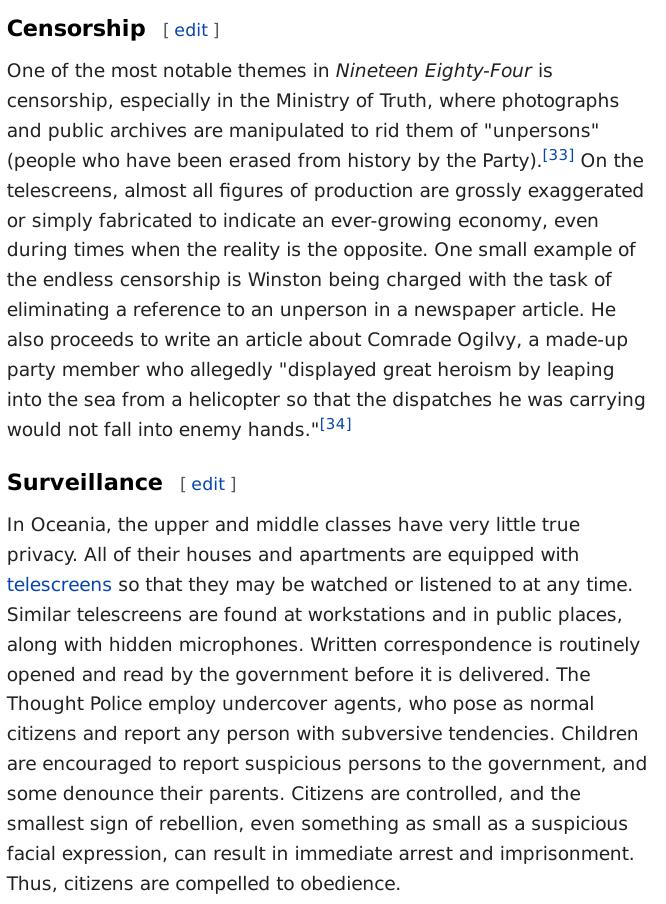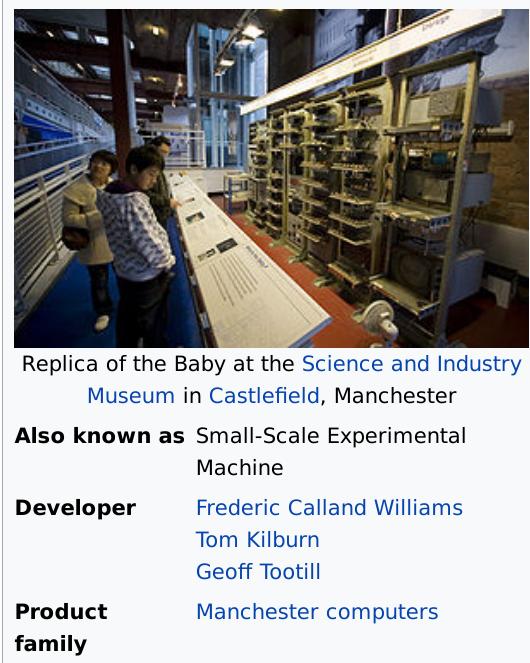

Wikipedia on Nineteen Eighty-Four
TECHNOLOGY is taking over (almost) everything. Our rights are being gradually eroded in the process. I wasn't always an activist and as an early adopter of GNU/Linux I wasn't always an activist for "Software Freedom" or "Free Software" or whatever. When I was first introduced to it (as a teenager) I didn't even know about GNU or the GPL. Apparently the same is true for most people, even geeks...
"Remember that back then Linux was just some lousy new project almost nobody knew about, unlike GNU..."GNU predates Linux of course, BSD or UNIX predates GNU (even if not by the name "BSD"), and UNIX isn't the epoch of computing. Computers in general go a very long way back. Here in Manchester we like to pretend to be the home of the world's first computer, albeit the caveat is "programmable". We're almost certainly the home of the first GNU/Linux distro (known as "MCC", same name as my employer for about 3-4 years; my colleague was the first to combine GNU and Linux). Remember that back then Linux was just some lousy new project almost nobody knew about, unlike GNU...
 In the years that followed, perhaps motivated by corporate interests, GNU philosophy was buried/ignored by the media and 6 years later they also rebranded the whole thing, using the term "Open Source" to distract from the vastly more meaningful concept, "Software Freedom" or "Free Software" (the latter has an inherently problematic ambiguity in English, as many interpret that as low-priced or gratis).
In the years that followed, perhaps motivated by corporate interests, GNU philosophy was buried/ignored by the media and 6 years later they also rebranded the whole thing, using the term "Open Source" to distract from the vastly more meaningful concept, "Software Freedom" or "Free Software" (the latter has an inherently problematic ambiguity in English, as many interpret that as low-priced or gratis).
The saying "Stallman was right" (or "RMS was right," to use his initials) is being proved more and more correct, or increasingly accurate, over time. Foresight or accurate predictions can be enumerated each year as the list grows. Nowadays many kitchens come with microphones in them -- spying devices (or bugs) that are remotely connected to datacenteres of the world's richest person. Did anyone foresee this in '1984' (Nineteen Eighty-Four) or even in 1983 when RMS announced the GNU Project?
"The saying "Stallman was right" (or "RMS was right," to use his initials) is being proved more and more correct, or increasingly accurate, over time."When it comes to technology, it's fundamentally clear (and a simple concept to grasp) that unless the user is in complete control of that technology, somebody else will be, either 'online' (in real-time) or 'offline' (pre-programming the technology to do potentially malicious things). Surveillance and DRM are just two examples of that. As time goes by we see billions of people being turned into 'digital slaves' of a smaller number of increasingly-powerful 'technology masters' (connected to governments, typically autocratic regimes with imperialistic objectives/ambitions). Some are literally being sponsored by the military and their behaviour is consistent with that of 'nanny states', striving for complete social control (including prediction of citizens' behaviour, based on perceived thoughts/intents).
Dwight Eisenhower once said:
“Though force can protect in emergency, only justice, fairness, consideration and cooperation can finally lead men to the dawn of eternal peace.”
"In the councils of government, we must guard against the acquisition of unwarranted influence, whether sought or unsought, by the military-industrial complex."
"Many of these companies would not be profitable without subsidies."And sure, it's likely even worse when someone in France or in China is coming to depend on some American companies, whose business model revolves around sucking up government/VC cash to spy on the world. Many of these companies would not be profitable without subsidies. So the business model is perhaps the subjugation itself (inverting the relationship between people and states). Taxpayers often foot the bill for their very own subjugation and these wrongs are made possible by terrible politicians who are only accountable to corporations and oligarchs ("campaign contributors").
For people who want more control over their lives, over their politics, over elected officials and even military commanders (who must never become unaccountable), removal from the monopolistic grid and greed of proprietary software will become imperative. It's not enough to only change one's own habits; peers, friends, family and colleagues need to follow, partly because of network effects (e.g. being able to call someone or send a personal message without centralised platforms which harvest and mine communications).
"Information begets action."Free software pioneers laid the ground or planted the seeds early enough for a reactionary force to grow roots; we now have reasonably potent alternatives to back-doored (by government instructions) technology that spies, censors and sometimes assassinates people. What's needed is widespread adoption. For adoption to gain momentum we need to better inform people. Information begets action. ⬆